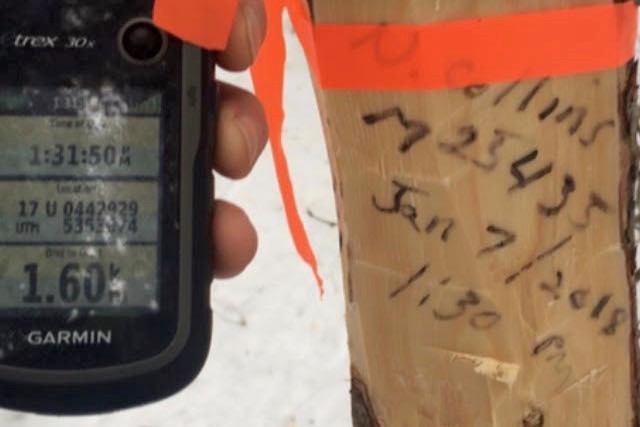With last day for claim staking in Ontario on the horizon, an event in Timmins is honouring the end of an era in prospecting.
The Last Post event is being held at the Hollinger Park Monday (Jan. 8) and is bringing together area prospectors on the final day for claim staking in the province.
The traditional process is being replaced by the Mining Lands Administration System, an online mining claim registration hub.
While the Ministry of Northern Development and Mines (MNDM) says the change will provide a level playing field for registering mining claims, a local prospector questions the fairness of the system.
Norm Collins, who has been prospecting for 25 years and is a co-owner of Compass Exploration, is one of the prospectors who will be at Monday’s event.
Through the years, he said there’s been a fair system in how claims can be acquired.
When important claims expired, he said stakers would show up, the rush would start at 9 a.m. and whoever finished first won it.
With the online mapping system, he worries a mining company could take thousands of claims.
“In the past they couldn’t do that because there was only so many stakers you could hire to go do that, which gave a chance to everybody else — or other stakers and other prospectors — to kind of get in there and get a piece. That’s where everyone’s kind of iffy on the new rules, they won’t be so fair any more for the smaller prospectors,” he said.
Online registration is being used in other provinces.
According to the MNDM, those systems haven’t led to large areas being tied up by a few companies.
“Ontario is considering methods to prevent big companies from registering a disproportionate number of claims, such as limiting the number of claims that could be registered during a single transaction,” reads a statement from the Ministry.
With the new system, people will have 24-hour, self-serve access to mining claims registration. It also allows people to register claims anywhere in the province.
While the MNDM says the current system benefits medium to larger companies with the resources to transport stakers to acquire claims, Collins says it’s the new system that will benefit corporations and cut the smaller guys out.
“As local prospectors if there was something happening in our area… we were able to hurry up and get a piece before any outsider could,” Collins explained.
According to the Ministry, “MLAS will provide a level playing field for how mining claims are registered and enhance the province’s competitiveness in the mining industry.”
Implementation, impact on Indigenous communities
Traditional claim staking will end at midnight Jan. 8.
Following that there is a 90-day period when claim-staking and other transactions will not be allowed.
This month, the MNDM said claim holders are being sent enrolment packages, which can be used to log onto MLAS and set up a profile.
Stage one of the new system is being introduced Feb. 7, followed by an official launch April 10.
Improving notification to Indigenous communities is another benefit of the changes noted by the MNDM.
“Currently, when a new mining claim is recorded, Ontario sends a letter to the claim holder and potentially impacted Indigenous communities in the vicinity of the mining claim encouraging early engagement and relationship building,” reads the statement.
“The new MLAS notification process would provide information to Indigenous communities about newly recorded mining claims in their vicinity in real time. The notification would also include contact information for the claim holder.”
'So many adventures'
With the deadline looming, Collins has turned away clients wanting him to go stake. There isn’t enough time to do it all, he said, especially with the cold weather.
While claim staking is just one part of prospecting, for years it’s what Collins and Chad Gloster at Compass Exploration specialized in.
Modernizing the Mining Act has been in the works for four years, so they’ve been preparing for the shift.
Still, Collins will miss claim staking.
He said the process of being in the bush and walking the lines, helps train a good prospector.
“If you like the outdoors, it’s a great job,” he said. “It’s nice to be out there.”
He said there have been many adventures in the last 10 years with Gloster.
“We’ve come out at midnight to our truck just ‘cause we hit some bad bush, or we got cut off by what we thought was a crossable creek and ended up being a small river,” he recalled. “You kind of get put in these situations and it’s always, there’s no way out, you’re literally going places where people don’t go. We’ve had so many adventures, those are the parts I’m going to miss for sure.”
The Last Post
Prospecting has a rich history in the area.
More than 100 years ago the Porcupine Gold Rush attracted prospectors from near and far.
The excitement of staking claims and unearthing the next big discovery still exists today.
“This is probably the heart of prospecting country, especially in Ontario,” Collins said. “It’s one of those obscure jobs you really have to get into the game to understand it.”
Ken Pye is making sure that the last day of claim staking doesn’t go unnoticed.
He is organizing The Last Post Jan. 8 at the Hollinger Park starting at 4:30 p.m.
There will be four claim posts in each corner of the park. Local stakers will sign the post and leave their prospector’s license number. The posts will then be brought to the Timmins Museum for display.

